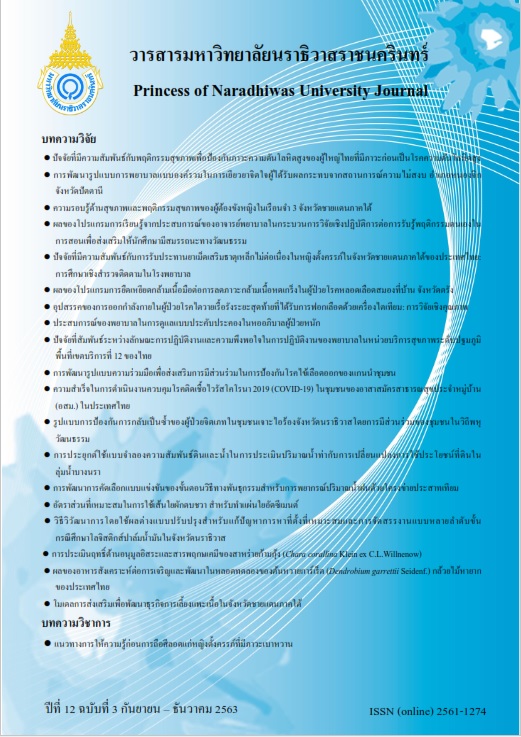Effects of the Experiential Learning in Action Research Process Program of Nurse Instructors on Their Self-perception of Teaching Behaviors Enhancing Nursing Students’ Cultural Competencies
Effects of the promoting learning through action research program on teaching cultural competence in nursing students
Keywords:
Cultural competence, Teaching behavior, Experiential learning, Action researchAbstract
The purpose of this quasi-experimental study was to explore effects of using the experiential learning in action research program of nurse instructors on their self-perception of teaching behaviors enhancing students' cultural competencies. The experimental group was 30 nurse instructors from Boromarajonani College of Nursing, Phra Phutthabat who participated in the experiential learning program. The comparison group was 24 nurse instructors from a nursing college which taught the same curriculum as the experimental group. The comparison group received the standard teaching method from the college. The research instruments comprised of the experiential learning program and the self-perception of teaching behaviors enhancing students’ cultural competencies questionnaire composing of 4 dimensions including 1) cultural knowledge, 2) cultural skill, 3) culturally sensitive-model, and 4) cultural encounter. Cronbach’s coefficient was .83. Data was analyzed by using mean, standard deviation, and independents t-test.
The results showed that the total mean score of self - perception of behaviors of the experimental group was significantly higher than the comparison group (P <.01). Considering each dimension, it was found that the mean score of cultural skills and cultural encounter of the experimental group was significantly higher than the comparison group (P <.05, P <.01, respectively). The research results suggested that the learning program could develop self-perception of teaching behaviors among teachers. Therefore, this program should be used in many courses of nursing practical studies.
References
Baghdadi, N. A., & Ismaile, S. (2018). Cultural competency of nursing faculty teaching in baccalaureate nursing programs in the United States. Australasian Medical Journal, 11(2), 126-134.
Beard, K. (2016). Examining the impact of critical multicultural education training on the multicultural attitudes, awareness, and practices, of nurse educators. Journal of Professional Nursing, 32(2), 439–448.
Bradley, P. (2017). Using Digital Stories to Increase Nurse Educator Cultural Competence in Ontario, Canada. Retrieved January, 3, 2020 from https://sigma.nursingrepository.org/handle/107 55/ 621904.
Campinha-Bacote, J. (2002). The process of cultural competence in the delivery of health care services: A model of care. Journal of Transcultural Nursing, 13(3), 181-184.
Checkland, P., & Holwell, S. (2005). Action Research: Its Nature and Validity. In B. Cook, & J. W. Cox. Fundamentals of Action Research Volume 3, Social Changes Application, The Partitions and Action Research Knowledge. London: SAGE Publication.
Chirawatkul, S. (1996). Transcultural nursing. Thai Journal of Nursing, 45(1), 8-16.
Creswell, J. W. & Miller, D. L. (2000). Determining validity in qualitative inquiry. Theory into Practice, 39(2), 124-130.
Farber, J. E. (2019). Cultural competence of Baccalaureate nurse faculty: Relationship to cultural experiences. Journal of Professional Nursing, 32(6), 439–448.
Gillson, S. & Cherian, N. (2019). The importance of teaching cultural diversity in Baccalaureate nursing education. Journal of Cultural Diversity, 26(3), 85-88.
Kemmis, S. & McTaggart, R. (2005). Participatory Action Research: Communicative Action and the Public Sphere. In Handbook of Qualitative Research. 3rd (Edit by Denzin, N. K. & Lincoln, Y S. London: Sage Publications.
Krogh, L. (2007). Action Research as Action Learning as Action Research as Action Learning at Multiple Levels in Adult Education. Retrieved December, 8, 2007, from www.avetra.org.au/abstracts and paper_2001/krong_full.pdf.
Lofman, P., Pelkonen, M. & Pietila, A. (2004). Ethical issues in participatory action research. Nordic College of Caring Science. Scandinavian Journal of Caring Sciences, 18(3), 333-340.
Maddalena, V. (2009). Cultural competence and holistic practice: Implications for nursing education, practice, and research. Holistic Nursing Practice, 23(3), 153–157.
Melrose, M. J. (2001). Maximizing the rigor of action research: Why would you want to? How could you? Field Method, 13(2), 160-180.
Praboromarajchanok Institute for Health Workforce Development. (2012). Standard of Bachelor Degree in Nursing Science. (Revision Curriculum on 2012). Ministry of Public Health Thailand. (in Thai).
Shangri-la, S. (2017). G*Power: Alternative Program for Sample Size Calculation. Retrieved May, 29, 2020 from https://www.facebook.com/notes/heaven-shangri-la/gpower.
Siriphan, S. & Songwathana, P. (2014). Teaching methods for enhancing cultural competency of nursing students based on theoretical concepts of Campinha-Bacote. Princess of Naradhiwas University Journal, 6(1), 146-157.
Siswadi, Y., Prabawati, D., Purwarimi, J., & Prongantung, H. (2018). Cultural competence of nursing faculty in Indonesia. International Journal of Medical Research & Health Sciences, 7(8), 97-102.
Smith, L. S. (2017). Cultural competence: A nurse educator's guide. Nursing, 47(9), 18–21.
Songwathana, P., Hirunchunha, S., Sangchan, H., Petpichetchian, W., & Khampalikit, K. (2009). Curriculum development for cultural competence improvement of nursing students in Faculty of Nursing, Price Songkla University. (in Thai).
Songwatthanayuth, P. Sosome, B., & Karuncharernpanit, S. (2018). Theoretical course environment that promotes cultural competence through the perception of nursing students, Prachomklao College of Nursing, Phetchaburi Province. Journal of Education and Human Development Sciences, 2(1), 133-141.
Sosome, B., Chaowaing, K., Suwannaka, Y., & Kirkgulhorn, T. (2018). Nursing students' perceptions toward nurse instructors teaching for promoting the cultural competence: The construct validity of the instrument. Journal of Nursing and Health Care, 36(1), 127-135.
Suwannaka Y., & Sosome (2017). Cultural competence: the challenging for Thailand’s nursing education. Journal of Health Science, 26(3), 961-970.
Suwannaka, Y., Sosome B., & Chaowaing, K. (2016). The developmental model for enhancing cultural competences of nurse instructors and Bachelor nursing students. Journal of Nursing and Health Care, 34(4), 162-171.
World Health Organization. (2016). Nurse Educator Core Competencies. Retrieved February 1, 2020 from https://www.who.int/hrh/nursing_midwifery/nurse_educator050416.pdf.




